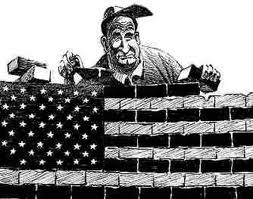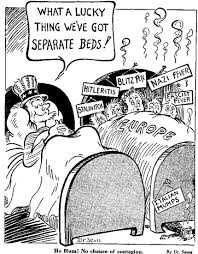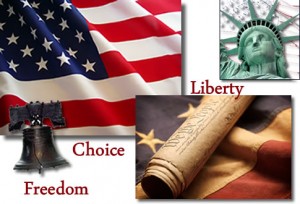After the First World War the economy of America was thriving, during the 20’s the country The United States was emerging as the industrial giant of the world, they show how powerful they could be and they had a particularly style of life. However, due to the costly experience of World War I and the Great Depression during the 30’s, America immediately went back to an isolationist foreign policy, avoiding its involvement in foreign conflicts (Until World War II).
The interwar period, From 1919-1941, the American public demanded isolationism to avoid costly wars and loss of American lives in overseas ventures. Understanding isolationism as “ the policy or doctrine of isolating one’s country from the affairs of other nations by declining to enter into alliances, foreign economic commitments, international agreements, etc., seeking to devote the entire efforts of one’s country to its own advancement and remain peace avoiding foreign entanglements and responsibilities.” (Dictionary.com, 2013). Nonetheless, the American neutrality announced by the president Wilson was a contradiction because they proclaimed nonintervention but they didn’t it in practice. Wilson had banned foreign loans to prevent Americans from developing economic connections that would give them a vested interest in the outcome of the struggle. But it did not include interbank credits, a serious omission (Thernstrom, 1984). Woodrow Wilson was an anglophile and was very supportive of good relations with Britain, he moved to a process of loans and investments that favored the Allies and redirected trade towards England, while being very stern against Germany due to it´s development in submarine “U-boat” technology. In contrast, the United States had an interventionism stance supported ideals such as the League of Nations, US interventionism continued in the realms of foreign trade, repayment of foreign debt and support of international peace.
Two events lead to the end of U.S. neutrality. On one hand, the sinking of the Lusitania vessel which ended up killing 128 American citizens. On the other hand, the interception of a telegram from German Foreign secretary Hans Zimmerman proposing an alliance between Germany and Mexico against the United States. Woodrow Wilson was confident that American entry into European war would help spread American democratic freedoms to the rest of the world. It certainly did not enlarge the freedoms available to the ordinary American at home. (Thernstrom, 1984).
 The war had many such unanticipated effects on American life, some of them temporary, some of them far-reaching. It leads the federal government into deeper involvement in the management of the economy than ever before. Most important, it unleashed waves of hysteria and xenophobia that drowned out dissent, and contributed to the triumph of two intolerant and repressive “reforms” which are immigration restriction and national prohibition. Thernstrom, 1984). The Great Depression intensified the United States to more severe policies of isolationism through the establishment of various institutions and increased feelings of xenophobia when the United States Congress approved a series of immigration restrictions between 1917 and 1924 that reversed the nation’s historic free immigration policy. The war and the “Red Scare” because of the ‘threat’ from communism or the war spreading. Immigration law. Forms of restriction included tough literacy tests for immigrants (particularly Chinese and Japanese) but also restrictions on people coming from Eastern Europe or other Socialist countries.
The war had many such unanticipated effects on American life, some of them temporary, some of them far-reaching. It leads the federal government into deeper involvement in the management of the economy than ever before. Most important, it unleashed waves of hysteria and xenophobia that drowned out dissent, and contributed to the triumph of two intolerant and repressive “reforms” which are immigration restriction and national prohibition. Thernstrom, 1984). The Great Depression intensified the United States to more severe policies of isolationism through the establishment of various institutions and increased feelings of xenophobia when the United States Congress approved a series of immigration restrictions between 1917 and 1924 that reversed the nation’s historic free immigration policy. The war and the “Red Scare” because of the ‘threat’ from communism or the war spreading. Immigration law. Forms of restriction included tough literacy tests for immigrants (particularly Chinese and Japanese) but also restrictions on people coming from Eastern Europe or other Socialist countries.
The long drive for immigration restriction finally triumphed because of the anxieties and hatreds stirred up by World War I. The same can be said for another reform movement with an even longer tradition-the crusade against the Demon Rum. The Eighteen Amendment to the constitution (1919) which banned alcohol from the land. New lobbying groups appeared into he United States in relation to this prohibition: the Christian temperance Union, the Anti-Saloon league among others. The roots of the prohibitionist force came from small towns and farming areas of the Midwest, West and South and through moral campaigning and recurring to the anti-immigration spirit it moved into the urban areas of America (New York and Chicago). What made this prohibitionist movement unique was the fact that it was the ban was intended to be permanent and embedded into the Constitution, and in its way was a way of expressing the anti-immigration spirit, focusing on the “immoral” standards of Europe.( Thernstrom, 1984).
The election of Roosevelt in 1932 introduced a new strand of policies. The New Deal focused on overcoming The Depression and pushed America’s foreign policy towards isolationism and again focuses on internal domestic affairs known as “Relief, Recovery and Reform” as a political project dealing with economic, military and political issues. (Jenkins:277). The great Depression finished with the prosperity of the 20’s, the economy was changing and was necessary to enforced the country, that’s why Roosevelt really wanted interventionism and the New Deal implemented 1933 had the objective of getting the U.S. out of the Great depression. It´s measures included employment support and employment generation measures, initiatives for public work and incentives for private investment.
The great depression changes the panorama for world politics and U.S. foreign policy, the principal objective was to preventing the U.S. from becoming involved in another war. But through the “quarantine speech in 1937”, Roosevelt tried to break away from isolationism. He was talking about the need for a collective security and the U.S responsibility to prevent the spread of war.
Finally as a conclusion the history reflects that the United States during the inter war period adopted an isolationism policy because the country didn’t want to suffer the costs of the war. Also, “close their boundaries” helped the country to
Increase their power as much as possible until became as a hegemonic country in the world, also the geostrategic position of the country helped to avoid the interventionism, especially with the Great Depression in my opinion, the best solutions and policy was isolationism. However with the outbreak of the Second World War was unavoidable the interventionism and the foreign policy change extremely.
References
• Breve historia de los estados Unidos. Phillip Jenkins. Capítulo: Guerra e influencia mundial (1917-1956) pp. 257 – 314
• Dictionary. Com. 2013. Concept of isolationism. [Online]. Available at:
http://dictionary.reference.com/browse/isolationism. [Accessed: 21 Mar 2013].
• Thernstrom S. (1984), ‘A History of the American People Volume Two: Since 1865’, Harcourt Brace and Jovanich ed. Pp 540 – 562.





